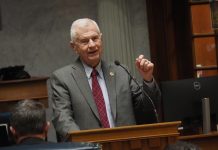by Stephanie Wang for Indiana Chalkbeat
Four years ago, Jennifer McCormick was a triumph for the Republican Party — a public school superintendent who snatched back Indiana’s top education office from a pesky Democrat.
Now, the Indiana GOP considers McCormick a traitor.
She’s siding with the Democrat trying to unseat the Republican governor. She’s endorsing Democrats in hotly contested races for state lawmaker seats, attorney general, and Congress. She’s betraying the party that got her elected.
McCormick does not care.
“They want me out. That doesn’t hurt my feelings right now,†she told Chalkbeat. “What is alarming is the direction, from the federal level on down, that Republicans are going regarding education. I just simply do not agree with it… I believe in public education. That’s just who I am, and I make no apologies for that.â€
After a term spent clashing with a Republican stronghold at the Statehouse, McCormick is jaded — but she’s not done. During her last months in office, she’s putting whatever political weight she might hold behind trying to overthrow the forces that she felt held her back and undercut her work shaping education policies.
Her bipartisanship probably won’t make too many ripples, political watchers say. But she doesn’t have a lot to lose.
McCormick is putting a point on a bigger issue. Her political stand echoes the crescendoing cries of teachers’ discontent over the past decade as they have tried to claw back some of the power, respect, and money that they feel Republicans have taken away from public education.
Indiana ranked last in the nation for teacher salary raises over a 15-year period, according to a Forbes study. Teachers lament needing to pay for pencils, watching class sizes grow, and having too few counselors to support students.
“The Republican supermajority has not been especially friendly to teachers, and I think that’s probably why even Dr. McCormick, she’s a Republican yet she’s supporting Democratic candidates,†said Sandra Vohs, president of the Fort Wayne Education Association. “We’ve been burdened by a lot of unnecessary rules and regulations.â€
Next year, teachers could lose the supporting role of the state’s education chief — a voice that, depending on who’s been in office, has both helped them and hurt them. Indiana will no longer elect a state superintendent but look to the governor to appoint a secretary of education, leaving many wondering whether that person will be a champion or a puppet.
But state leaders will still have to reckon with educators’ concerns. Teacher pay and school funding, especially with the pandemic, pose two huge issues.
As McCormick puts it: “There is a crisis in K-12 education.â€
Targeting the Republican supermajorities
The bulk of McCormick’s dozen or so Democratic endorsements seek to break up Republicans’ supermajorities in the state House and Senate.
With the two-thirds majority in both chambers, Indiana Republicans can easily bypass Democrats, hashing out discussions in private and stopping Democrats from meaningfully shaping bills.
Democrats don’t have a realistic shot at flipping the tables. But if they can knock the Republicans down to just a regular majority, “it gives them a bargaining chip,†said Charles Taylor, managing director of the Bowen Center for Public Affairs at Ball State University.
McCormick endorsed several Democrats fighting tight races, including the House speaker’s challenger and a schoolteacher seeking re-election.
The supermajority “does not allow for good, sensible proposed policy to even be heard,†McCormick said. “It just won’t go anywhere.â€
Endorsing Democrats is a low-risk move, considering the GOP has already rejected McCormick, and “she’s one of the lamest of lame ducks — not only is she not running again, but nobody’s running for that office again,†Taylor pointed out.
Many teachers have protested the Republican charge to expand school choice, strip unions of bargaining rights, and add requirements they’ve since walked back on teacher evaluations and training.
That’s why McCormick holds broad appeal among teachers as she advocates to reduce challenges for traditional districts. She has supported expanding preschool access and lessening the emphasis on standardized tests. Educators like McCormick’s direct and open style, and feel they can get answers and clarity from her.
On some issues, Republicans have agreed at least in part with McCormick: They decoupled test scores from teacher evaluations, shielded schools from low scores after changes in standardized tests, and incrementally increased school funding.
McCormick’s stances, however, alienate influential school choice advocates. She has buckled down on criticism that charter schools have proliferated without enough oversight to ensure quality. She has also called for prohibiting private schools that accept publicly funded vouchers from discriminating against LGBT students and teachers
Betsy Wiley, president and CEO of the school choice advocacy organization Institute for Quality Education, said McCormick has shown “just an absolute disdain†toward charter and private schools and infused “a lot more negativity†in how her department treats school choice issues.
In distributing coronavirus relief funds, for example, McCormick blocked charter schoolsfrom receiving a grant after initially approving their applications.
“I think she has slowed the progress [of educational choice] with her rhetoric and her position,†said Wiley, whose group once supported McCormick. “But she’s not in a position to stop it.â€
Aligning with Democrats
McCormick’s friendliness with Democrats isn’t surprising. This is who she was even when she sought the GOP’s nomination in 2016 for state superintendent.
She had acknowledged her “checkered†voting past, as someone who sometimes voted Democrat and sometimes Republican. She ran as a district superintendent raising the alarm over the teacher shortage and pledging to cut through the political squabbling.
The Republican Party chose McCormick over a more conservative candidate. She could relate to educators, a critical piece in contending against popular Democrat Glenda Ritz.
Riding Indiana’s red wave backing Donald Trump for president, McCormick prevailed. As state superintendent, she quickly won over teacher’s unions by supporting districts and amplifying educators’ voices on issues.
Republicans “expected that they were getting a yes-woman, and that was not what they got,†said Ben Yoder, a Hamilton Southeastern teacher who serves on the Indiana State Teachers Association’s board of directors. “They got someone who was really standing for public education, standing for teachers, and standing for kids.â€
Opposing the governor
McCormick’s most interesting endorsement aims to oust fellow Republican Gov. Eric Holcomb, by backing his challenger Woody Myers. She’s agreed to serve as Myers’ secretary of education if he wins.
It seems like a long shot: Myers has trailed in polls and lagged in fundraising, and Holcomb appears to be heading to easy reelection.
But McCormick’s support indicates her power struggle with Holcomb.
McCormick frequently clashed with the State Board of Education, where most members are appointed by Holcomb. The dual system of education governance, with the state board crafting policy and the education department carrying it out, left a lot of room for disagreements.
“If we could be smarter at the state level, we could help all schools,†McCormick said.
Much of the strife, however, goes unacknowledged by other Republicans, including Holcomb, who hasn’t publicly addressed it but rarely appears with McCormick. Holcomb’s campaign did not respond to a request for comment about McCormick nor say who he would appoint as education secretary.
Holcomb has said he wants someone “fluent†in education and who understands the full pathway of a student through K-12 and their pathway after graduating high school.
Libertarian candidate for governor Donald Rainwater said he’d name McCormick’s opponent for the 2016 GOP nomination, Dawn Wooten, for the role.
If McCormick doesn’t continue as Indiana’s top education official, she said she’d welcome a break from the political scene.
After the election
Will her voice matter?
McCormick could help bring education to the forefront for some candidates.
For some educators, McCormick’s show of bipartisanship is a rallying cry in a divisive election year. To them, she proves that education issues don’t have to fall along party lines.
Educators have gained momentum on their issues, as evidenced by last year’s monumental turnout for the Red for Ed rally, where McCormick pulled on red boots to stand with teachers calling for more school funding, higher pay, and better working conditions.
The pandemic, too, has put teachers in a new spotlight as schools reopen and juggle in-person, online, and hybrid instruction. It’s shown how quickly educators have adapted, how hard their jobs are, and how critical it is for students to be in school.
That puts added pressure on lawmakers to support schools financially.
Restive teachers are watching carefully to see who becomes the next state education leader, said Vohs, the Fort Wayne teachers union president. If that person doesn’t support them, she said, “I think it might actually give fuel to the movement.â€





